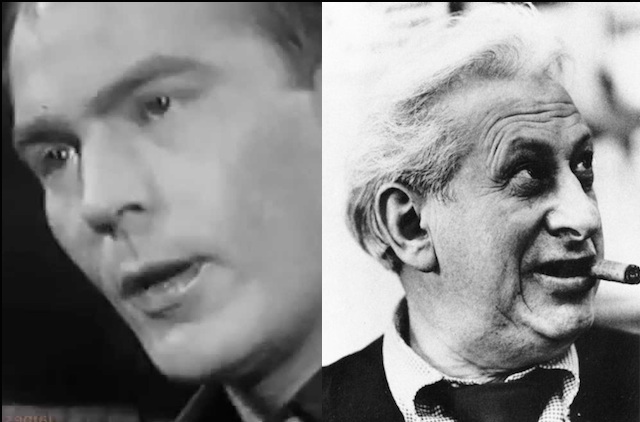Listen To Studs Terkel's 1973 Interview With Hunter S. Thompson
By Mae Rice in Arts & Entertainment on Feb 22, 2016 4:42PM
Before there was “Fresh Air” or “WTF with Marc Maron,” there was Studs Terkel’s radio hour on Chicago’s WFMT. Terkel, a Pulitzer Prize-winning oral historian, had a daily show that aired from 1952 to 1997. All told, that’s more than 9,000 hours of interview audio—which, though produced at a “Fresh Air” level, had a conversational, friends-having-a-broadcasted-beer feel similar to “WTF.”
We’re not alone in noting those similarities. Tony Macaluso, director of the Studs Terkel Radio Archive, told Chicagoist that Terkel’s show “broke a lot of the mold of the radio.”
“Podcasting, storytelling, mixing genres… he was the forefather of all of that,” Macaluso said.
Now, courtesy of the Archive, Chicagoist has an exclusive installment of Terkel’s show—never posted online before—in which Terkel interviews Hunter S. Thompson, circa March 1973.
Thompson, a correspondent for Rolling Stone at the time of the interview, was in the studio to promote his then-forthcoming book, Fear and Loathing on the Campaign Trail ‘72. Rooted in his reporting for the magazine, it covered the 1972 presidential election: a face-off between Republican Richard Nixon (whom you may have heard of!) and Democrat George McGovern (whom you may have not!).
That book’s title is a reference to Thompson’s first, most famous book, Fear and Loathing in Las Vegas—a lightly fictionalized but mostly autobiographical account of a drug-addled weekend trip to Vegas. Many cite it as the beginning of gonzo journalism, which Thompson describes, in this segment, as a form emphasizing “total subjectivity, out-front bias… participation, I think, is the key word. You are a part of the story. You’re not covering it… You get into it.”
Terkel and Thompson were very different. Thompson was a “wild, drug-using… very volatile person,” as Macaluso put it, while Terkel, “he liked to have his martinis and so forth, but he wasn’t the unleashed force of nature that Hunter S. Thompson was.”
Still, they feel like well-matched conversational partners.They’re both stars of a genre—Thomspon kickstarting modern journalism, and Terkel working in oral history, a traditional mode he was trying to keep alive. (If Clickhole’s “Oral History of Mad Men” is any indication, Terkel succeeded!) It’s worth a listen if only to hear two people at the top of their respective games in conversation.
They also cover some interesting ground. The whole point of the show is for interviewees “to be able to really dive deeply, and say things you wouldn’t normally say… not just talk in short soundbites,” Macaluso said—so pulling out a highlight sort of ignores what’s great about the format.
However, we’ll do it anyway: One highlight of the show is when Thompson, a known liberal and “activist journalist,” talks about a car ride on which he spoke one-on-one with Nixon, after weeks of failed attempts.
Thompson recounts someone from the Nixon campaign telling him, “The boss wants to talk football, and I’ve tried everybody else in the press corps and they don’t know football at all... but you have to promise to not to talk about anything else except football.” So he rode in Nixon’s car with him, and, though everyone was poised to throw him out on the side of the freeway if he mentioned Vietnam, he stayed true to the terms of the ride and talked strictly about football.
“I really enjoyed myself,” he said.
Other topics include: the line between fact and fiction, wrestling with alligators, the evolution of the Hells Angels, the parallels between power and drugs, and the fact that Thompson once ran for Sheriff of Aspen.
If you like this segment, you can also donate to the Studs Terkel Radio Archive’s Kickstarter, open until Feb. 25, whose proceeds would help the Archive team digitize 1,000 Terkel interviews that could be listened to (and remixed) for free online.
